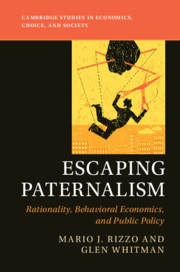
-
Select format
-
- Publisher:
- Cambridge University Press
- Publication date:
- 02 December 2019
- 05 December 2019
- ISBN:
- 9781139061810
- 9781107016941
- 9781108760003
- Dimensions:
- (228 x 152 mm)
- Weight & Pages:
- 0.85kg, 506 Pages
- Dimensions:
- (228 x 152 mm)
- Weight & Pages:
- 0.73kg, 506 Pages
You may already have access via personal or institutional login
Book description
The burgeoning field of behavioral economics has produced a new set of justifications for paternalism. This book challenges behavioral paternalism on multiple levels, from the abstract and conceptual to the pragmatic and applied. Behavioral paternalism relies on a needlessly restrictive definition of rational behavior. It neglects nonstandard preferences, experimentation, and self-discovery. It relies on behavioral research that is often incomplete and unreliable. It demands a level of knowledge from policymakers that they cannot reasonably obtain. It assumes a political process largely immune to the effects of ignorance, irrationality, and the influence of special interests and moralists. Overall, behavioral paternalism underestimates the capacity of people to solve their own problems, while overestimating the ability of experts and policymakers to design beneficial interventions. The authors argue instead for a more inclusive theory of rationality in economic policymaking.
Reviews
'Taking issue with the narrow norms of rationality in much of behavioral economics, this remarkable book argues in favor of an inclusive concept of rationality and is one of the first to cover the full range of relevant empirical evidence from psychology. Escaping Paternalism promotes a serious attempt to understand why people do what they do.'
Gerd Gigerenzer - Director of the Harding Center for Risk Literacy, Max-Planck-Institut für Bildungsforschung, Berlin
'Mario J. Rizzo and Glen Whitman have written an incisive yet accessible critique of the dominant strain of behavioral economics associated with Daniel Kahneman, Richard Thaler and Cass Sunstein. Rizzo and Whitman are wise enough to know that human beings, with quirks and practices, are ‘people, not puppets’. Yet they show how classical liberal principles of governance do far better in organizing social arrangements than the various forms of soft paternalism now in vogue with so many behavioral economists.'
Richard Epstein - Laurence A. Tisch Professor of Law, New York University
'Mario J. Rizzo and Glen Whitman present a powerful and well-documented critique of behavioural economists’ justifications of paternalism. They argue convincingly that these justifications illegitimately presuppose that rational-choice theory is a normative standard. Inspired by the psychology of Gerd Gigerenzer, they offer a more pragmatic and ‘ecological’ understanding of human rationality.'
Robert Sugden - University of East Anglia
Contents
Metrics
Altmetric attention score
Full text views
Full text views help Loading metrics...
Loading metrics...
* Views captured on Cambridge Core between #date#. This data will be updated every 24 hours.
Usage data cannot currently be displayed.
Accessibility standard: Unknown
Why this information is here
This section outlines the accessibility features of this content - including support for screen readers, full keyboard navigation and high-contrast display options. This may not be relevant for you.
Accessibility Information
Accessibility compliance for the PDF of this book is currently unknown and may be updated in the future.


